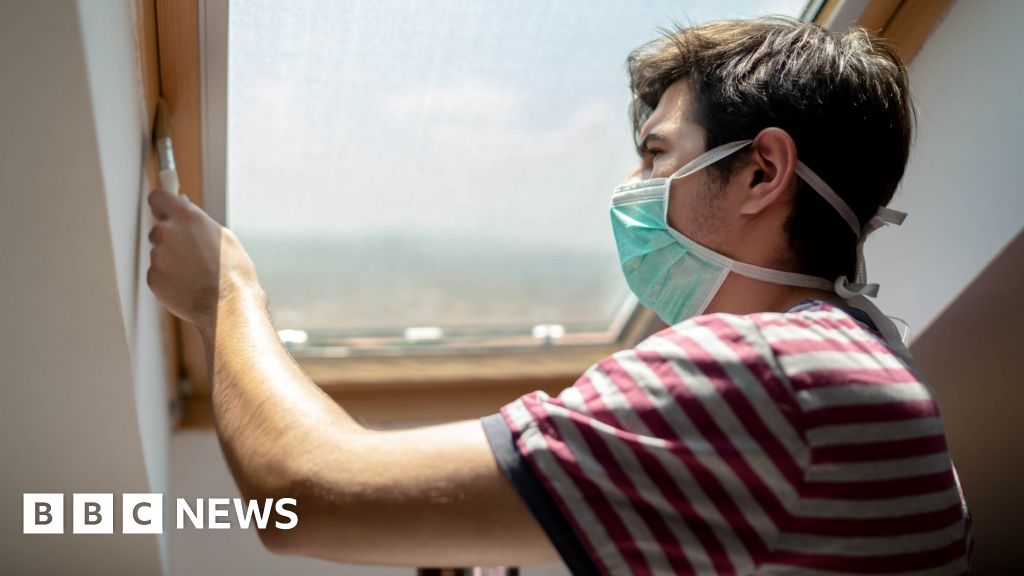Heatwave Risk From Plans To Convert Shops To Homes

By Roger Harrabin
BBC environment analyst
Planning reforms to convert shops and restaurants into homes could lead to more people suffering from potentially deadly heatwaves, claims a report.
From 1 August, firms will be allowed to redevelop a wider range of commercial property into flats.
It is hoped the move will regenerate City centres that have struggled during the pandemic.
But Zurich UK warns it risks creating more poor quality homes vulnerable to overheating in the summer.
At present, disused office space can be converted into residences without having to apply for planning permission.
From August, so-called permitted development rights will be expanded to allow vacant retailers, restaurants and gyms to be changed into homes.
But Zurich UK, the insurance group, said: "A rush to redevelop shops and offices left empty by the pandemic could create a swathe of sub-standard homes that are vulnerable to climate change."
Zurich said that small self-contained bedsits and studio flats could potentially become uninhabitable during increasingly hot summers.
It warned that many properties in built-up areas were affected by the "urban heat island" effect, where temperatures are hotter than outlying areas. It added these properties were also at risk from flash floods caused by heavy downpours on concrete surfaces.
"The post-Covid city may need to quickly adapt to new modes of behaviour, which could see many building types adapted for purposes not originally intended," said Tony Mulhall, associate director of the land professional group at the Royal Institution of Chartered Surveyors.
Already one in five homes in the UK overheats, according to the Climate Change Committee (CCC), the independent body which advises the government. The death toll from heatwaves is expected to triple by 2050 as temperatures continue to climb.
A government spokeswoman for Housing, Communities and Local Government said homes delivered through permitted development rights continued to make an important contribution to housing delivery.
She added that Zurich's "claims are based on unfounded assumptions".
"Our reforms will transform unused buildings into much-needed new homes, and all new homes must be of high quality and meet national space standards and building regulations, including ventilation requirements," she said.
'Hermetically sealed'
Last summer, heatwaves in England caused 2,556 deaths, with the CCC predicting numbers could triple from an average of 2,000 to 7,000 each year by 2050.
Mr Mulhall said following the change in permitted development rights: "A generation of hermetically sealed commercial buildings may now fall into this category to be repurposed for housing, needing to satisfy a completely different set of standards."
He added that while energy poverty - where residents cannot afford to heat their homes during the winter - was a recognised problem: "The other increasing concern is residential buildings which, due to increased natural temperatures, are tending to overheat.
"Some buildings when reconfigured as apartments with a single aspect may not allow for through ventilation as part of a natural cooling strategy."
According to Zurich UK's research, more than 64,700 flats have been created from disused offices in the last five years.
Between January and March this year, applications for office-to-residential conversions in England rose 28% to a three-year high "as developers snap up blocks left vacant by an exodus of workers from city centres".
Converted flats typically have big windows, but no air conditioning, and if all the windows face south, it can be impossible to escape sweltering heat.
The problem is exaggerated in flats fashioned from offices with a big square floorplate. The resulting apartments often face in only one direction - and this means they can't get a cooling through-draught.
Already one in five homes in the UK overheats, according to the Climate Change Committee, with heatwave death tolls expected to triple by 2050 as the UK warms.
Quality of life
Eddie Tuttle, director for policy, research and public affairs at the Chartered Institute of Building, said: "While we agree with the principle of permitted development rights to rejuvenate town centres, there is clear evidence that homes built using permitted development rights have led to spaces detrimental to the health, well-being and quality of life of future occupants."
Zurich wants ministers to think ahead to look at ways to climate-proof buildings.
It said developers could be required to improve cooling by fitting heat-reflecting windows, installing shutters and sunshades and using reflective surfaces and ceiling fans.
It added that developers should install leak detection and suppression devices.
"If fitted during the conversion, costs can be relatively modest and avoid huge disruption for residents," it said.
From Chip War To Cloud War: The Next Frontier In Global Tech Competition
The global chip war, characterized by intense competition among nations and corporations for supremacy in semiconductor ... Read more
The High Stakes Of Tech Regulation: Security Risks And Market Dynamics
The influence of tech giants in the global economy continues to grow, raising crucial questions about how to balance sec... Read more
The Tyranny Of Instagram Interiors: Why It's Time To Break Free From Algorithm-Driven Aesthetics
Instagram has become a dominant force in shaping interior design trends, offering a seemingly endless stream of inspirat... Read more
The Data Crunch In AI: Strategies For Sustainability
Exploring solutions to the imminent exhaustion of internet data for AI training.As the artificial intelligence (AI) indu... Read more
Google Abandons Four-Year Effort To Remove Cookies From Chrome Browser
After four years of dedicated effort, Google has decided to abandon its plan to remove third-party cookies from its Chro... Read more
LinkedIn Embraces AI And Gamification To Drive User Engagement And Revenue
In an effort to tackle slowing revenue growth and enhance user engagement, LinkedIn is turning to artificial intelligenc... Read more

